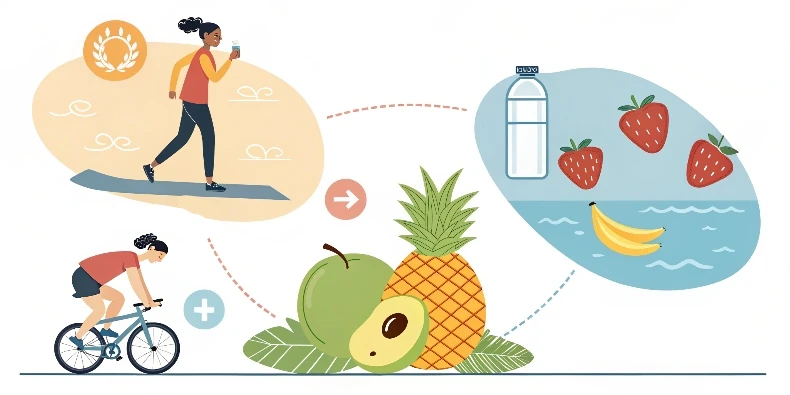Looking for ways to bring positive changes into your life? You might be interested in learning how to apply psychological techniques to achieve this goal.
With the right methods, you can strengthen your mental health, boost self-confidence, and succeed in various aspects of life. In this article, we’ll explore psychological approaches that can help you achieve lasting change. You’ll learn how to apply these tools in practice and discover the benefits they can bring.
Keep reading to find out how psychological techniques can be the key to improving your life.
Understanding the power of positive thinking
Positive thinking is a powerful tool that helps achieve success and happiness in life. By understanding its power, you can learn to focus on positive aspects, create optimistic outlooks, and find ways to overcome challenges.
It’s important to recognize that positive thinking isn’t about ignoring difficulties but acknowledging them and seeking solutions. It’s a process that transforms negative thoughts into positive ones and uses them as a driving force to move forward.
When faced with challenges, try to look at the situation from a different perspective. For example, if you feel overwhelmed by the need to complete a large task by the end of the week, focus on the steps you can take to simplify and make the task more manageable.
Positive thinking not only helps navigate everyday challenges but also improves overall emotional well-being. It’s about finding joy and inspiration in the things you love — whether it’s a person, an object, or an event — and recognizing how valuable they are to you.
The psychology of success is built on the ability to see opportunities even in difficult circumstances. Reflecting on how current events can positively impact your life helps you develop the skill to identify possibilities that lead to personal growth and well-being.
Techniques for positive thinking
Positive thinking techniques are a set of methods that help focus on the positive aspects of life. These approaches enable you to manage negative thoughts, boost motivation, and achieve your goals.

One of the most effective techniques is practicing affirmations. Affirmations are short, positive statements that a person repeats to themselves daily to strengthen their self-confidence. For example: “I am capable of overcoming any challenges” or “I am strong and confident”. Regular use of affirmations helps foster a positive attitude toward yourself and the world around you while reinforcing belief in your abilities.
Another powerful technique is visualization. Visualization helps maintain motivation and focus on your goals. It involves creating mental images of yourself achieving your objectives and living a life filled with success and happiness. For instance, you might imagine completing an important project or confidently tackling a challenging task with joy and ease.
The third technique is practicing gratitude. Consciously listing things you are grateful for shifts your focus from the negative to the positive. A daily gratitude practice — such as writing down three things that made you happy — enhances your mood and reinforces a positive outlook on life.
Stress management
Learning to manage stress is an essential part of maintaining both physical and mental health. Understanding the sources of stress and finding ways to address them can help reduce its negative impact on your life.
The first step in managing stress is identifying its source. For instance, if you feel overwhelmed by a heavy workload, try breaking tasks into smaller, manageable pieces and setting realistic goals. If the stress stems from complicated relationships, consider talking to a trusted person or seeking professional counseling to find ways to resolve the conflict.
An effective way to cope with stress is by creating an action plan that incorporates positive practices. For example, deep breathing or meditation can help lower your heart rate and calm your mind. If you feel drained from working nonstop, make time for a proper meal or spend the evening with your family to restore inner balance.
It’s important not only to react to stress but also to prevent it. If someone speaks rudely or asks questions that make you feel uncomfortable, it’s better to step away from the situation or avoid interacting with that person for a while. This approach helps prevent escalation and maintains emotional stability.
Managing stress requires awareness and proactive measures. Learn how to handle stress in different situations and apply strategies that help you stay calm and composed. This is a vital step toward achieving health and harmony in your life.
Setting achievable goals and creating a plan to achieve them
Setting achievable goals and creating an action plan are fundamental steps for those striving for success. Goals should be realistic, measurable, and time-bound. This approach provides clear direction, helps maintain motivation, and gives a sense of control over the process.
Creating a plan is a key stage on the path to achieving your goals. The plan should include specific steps necessary for reaching your objectives, as well as strategies for overcoming potential obstacles. Having a structured plan enables you to track progress, make adjustments, and stay focused on the outcome.
It’s important to consider your strengths and weaknesses when drafting your plan. Strengths are the skills, abilities, or qualities that help you complete tasks effectively. For example, if you have an excellent memory, recalling names at meetings becomes an advantage. Weaknesses, on the other hand, may make some tasks more challenging. If memory is not your strong suit, you might need additional tools to compensate for this limitation.
Before creating your plan, ask yourself the following questions:
- What is my goal?
- What result do I want to achieve?
- What are my strengths and weaknesses?
- What do I need to improve to achieve the desired outcome?
- How will I track my progress and adjust my actions?
By using these goal-setting methods and planning strategies, you lay a solid foundation for achieving success. A clear understanding of your resources and limitations allows you to turn goals into concrete actions, bringing you closer to your desired results.
Cultivating self-awareness and self-acceptance
Developing self-awareness and self-acceptance is the foundation for personal growth and self-fulfillment. These skills enable individuals to better understand themselves, recognize their strengths and weaknesses, and embrace them as integral parts of their identity.
Self-awareness is the ability to recognize your thoughts, emotions, and actions and understand how they influence your life and interactions with others. Acceptance, on the other hand, involves acknowledging these thoughts and feelings without judgment and taking responsibility for them.
Self-reflection plays a vital role in enhancing self-awareness. It helps identify your values, beliefs, and motivations, as well as understand how your behavior impacts those around you. By becoming aware of your behavioral patterns, you gain the ability to consciously work on changing them if needed.
However, the process of developing self-awareness and acceptance can be challenging. These aspects can even conflict with one another. For example, a person might be aware of their mental health struggles but may struggle to accept the impact these issues have on their life, hindering their progress. Often, people find it difficult to acknowledge certain behavioral patterns because doing so requires letting go of habits they’ve found comfortable.
Accepting your flaws is a difficult but essential step toward personal growth. By acknowledging your weaknesses, you open the door to working on them more effectively and fostering inner harmony.
The psychology of personal growth is built on a balance between self-awareness and self-acceptance. Recognizing your thoughts and emotions, along with accepting them, are crucial steps toward building a more conscious and fulfilling life.
Developing healthy habits to improve well-being

Establishing healthy habits plays a crucial role in maintaining overall well-being. These habits can enhance both physical and mental health, reduce stress, and boost productivity. Here are a few simple yet effective recommendations:
- Sleep: Ensure you get enough sleep each night. Adults are advised to sleep between 7 to 9 hours per night to recharge and maintain overall health.
- Physical Activity: Regular exercise is essential for both physical and mental health. Dedicate at least 30 minutes a day to moderate physical activity or spread this time across short sessions throughout the week.
- Stress Reduction: Managing stress is a vital part of a healthy lifestyle. Spend time in nature, practice meditation or yoga, or enjoy connecting with loved ones. These activities help calm the mind and relieve tension.
- Healthy Eating: Your diet should include at least five servings of fruits and vegetables daily, whole grains, lean proteins, and dairy products. This helps lower the risk of chronic illnesses and keeps you energized throughout the day.
- Hydration: Drink enough water to maintain proper hydration. It’s recommended to consume about eight 8-ounce glasses (roughly 2 liters) of water per day.
- Fiber: Aim for at least 25 grams of fiber daily to lower cholesterol levels, improve digestion, and reduce the risk of diseases such as diabetes and cardiovascular conditions.
- Caffeine Reduction: Limit your caffeine intake to no more than five cups (750 ml) per day. This helps prevent dependency, headaches, and feelings of anxiety.
Simple lifestyle changes, such as adopting these habits, can significantly impact your health and quality of life. Small steps taken today can lay the foundation for long-term well-being.
Practices for inner balance and building resilience against external influences
Developing resilience to stress through mindfulness practices is a vital component of a balanced and harmonious life. Mental practices such as meditation, yoga, and journaling help us manage challenges, maintain calmness, and achieve inner balance.
Mindfulness in daily life enhances self-awareness, emotional regulation, and strengthens relationships with others. One of the key techniques for fostering mindfulness is meditation. It teaches us to observe thoughts and emotions without judgment, enabling us to process complex feelings and avoid impulsive reactions. Meditation creates a space for personal growth, allowing us to address challenges with greater awareness.
There are many types of meditation that enhance resilience to external pressures. Among the most popular are:
- Mindfulness meditation — helps focus on the present moment.
- Loving-kindness meditation — nurtures a compassionate attitude toward oneself and others.
- Gratitude meditation — strengthens feelings of happiness and contentment.
Meditation can also improve concentration and relaxation skills. For example, studies show that participants in eight-week meditation courses demonstrate significant improvement in problem-solving abilities and emotional resilience.
Another valuable practice is maintaining a gratitude journal, where you record things you are thankful for each day. This reinforces positive thinking and helps focus on the good moments in life.
These mindfulness practices promote inner balance, reduce stress, and build resilience against life’s challenges, making you more grounded and confident in yourself.
The practice of gratitude and forgiveness for overcoming challenges
The practice of gratitude and forgiveness is a powerful tool for navigating life’s challenges. Gratitude helps us appreciate what we have, even in difficult circumstances, while forgiveness allows us to let go of anger and resentment that may weigh us down.
These practices reshape our perspective on adversity, reduce stress levels, and enable us to move forward. During tough times, it’s easy to succumb to anger and frustration, but gratitude reminds us of the positive aspects of our lives. This helps calm the mind, ease emotional pain, and focus on what truly matters.

Forgiveness offers liberation from anger directed at others. It allows us to understand that a person’s actions don’t always define their character and that holding onto resentment is unproductive. By forgiving, we release emotional tension and stop letting past conflicts dictate our well-being.
Gratitude and forgiveness not only have emotional benefits but also physical ones. For instance, gratitude stimulates the production of hormones like dopamine, which reduces anxiety and depression. This equips us to handle difficult situations more effectively.
Music can also complement these practices. It helps us relax, lowers stress levels, and connects us with our emotions. Soothing melodies strengthen the connection between the brain’s regions responsible for emotions and memory, enhancing positive recollections and diminishing the impact of negative ones.
Take a pause to reflect and create a plan
In the hustle of daily life, it’s easy to lose sight of your own needs and goals. Taking a pause to reflect and create a new life plan is a crucial step toward personal growth and development.
A break allows you to look at your situation with fresh eyes, prioritize effectively, and identify what truly matters to you. This time for reflection enables you to reassess your goals, review your tasks, and focus on specific steps that will help you make progress.
Creating a life plan might seem daunting, but it’s a key to achieving success. Start by analyzing your current situation. Take time to think about your goals, values, and priorities. Reflect on what brings you the most satisfaction and how you can achieve it.
Don’t forget to account for your daily responsibilities, lifestyle, and routine. This will help you craft a plan that is both realistic and achievable, aligning with your current circumstances and resources.
Regular pauses for reflection not only help you understand yourself better but also enable you to build a path leading to success, harmony, and self-fulfillment.



